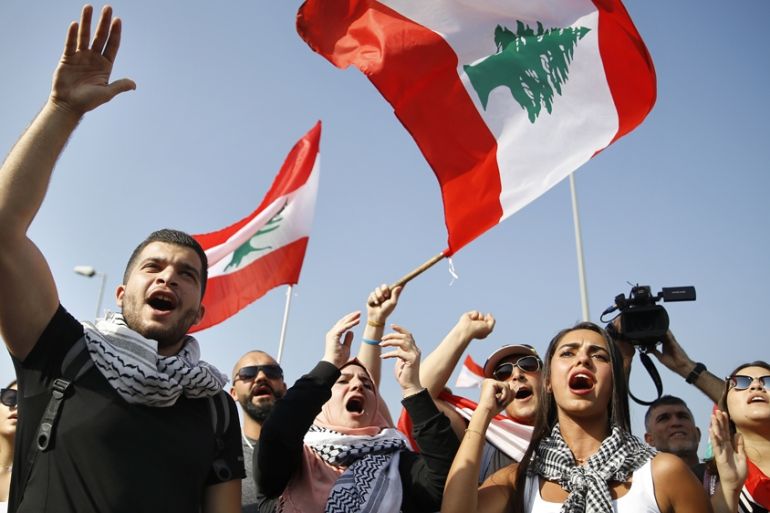Lebanon protesters incensed by Aoun’s ‘insulting’ remarks
In televised interview, President Aoun told demonstrators to ’emigrate’ if they see no decent people in Lebanon.

Beirut, Lebanon – Protesters burned tyres, threw stones at soldiers, and blocked roads across Lebanon as the country’s anti-government protests entered their fifth week.
Demonstrators marched towards the Presidential Palace in Baabda, incensed by President Michel Aoun’s assertion in a televised interview on Tuesday that if those demonstrating “see no decent people in this state, let them emigrate. They won’t get into power”.
Hundreds of Lebanese soldiers stopped the gathering protesters several hundred metres from the palace, blocking the road with jeeps, barbed wire, and three-man-deep lines of riot police in full body armour.
Tensions rose throughout the day with several scuffles and one arrest. Protesters daubed graffiti along the route with one slogan reading: “How do you sleep at night, Mr President?”
“His words were offensive, it was an insult; it just fueled everyone, made everyone very angry,” said Hala Nasreddine, wearing a Lebanese flag woven through her hair. “He came across as he has no idea how people are feeling or behaving and almost a month now people are on the streets, it hasn’t really gotten to him in any shape or form.
“And away from that reality on the ground he’s talking to us as if he is the Godfather and he saved us, and if we don’t like what he’s offering we should leave the country,” added the 48-year-old activist from Beirut.
“Who is he to tell us to leave our own country? If anyone should leave this country, it should be him and his cronies.”
‘All means all’
Aoun admitted negotiations over forming a new government have stalled, more than two weeks after the resignation of Prime Minister Saad Hariri. He is reluctant to return to head a new cabinet unless it is composed entirely of technocrats, one of the protesters’ key demands.
The president, however, said a new government must include existing politicians as “a technocrat government cannot define the policy of the country”.
It is unclear whether protesters will accept the return of Hariri or any of the existing politicians. If the oft-heard chant of the month-long protest movement, “Kilon yanni kilon” – all of them means all of them – is anything to go by, they will not.
|
|
As the country enters its second month of continuous demonstrations, banks remain closed after workers went on strike, fearing for their safety after several tellers were attacked by customers, angry at unofficial capital controls being imposed by individual banks.
Universities and schools remain closed until further notice, and petrol stations have begun to ration fuel or have closed, saying their reserves will run out within a week. Aoun warned the country is heading for “catastrophe”, but in his third speech in as many weeks, offered no concrete solutions to protesters’ gripes.
While she does not expect the political system to change overnight, Nasreddine said the government’s refusal to make way for fresh faces in politics is further alienating protesters and driving their anger.
“The least they can do is step down and allow for new blood, new thinkers … to take over and do something for us for a change. They’ve had [power] for 30 years, they failed us,” she said. “If we try and we fail that’s our fault, but give us the opportunity to try something different, that’s our right.”
Aoun’s War
The demonstrations, which have remained largely peaceful since clashes on the first night on October 17, are now taking place in the shadow of a new reality; one that is spreading not only rage but fear.
On Tuesday, Alaa Abou Fakher, a member of the Druze Progressive Socialist Party, was shot in the head by a soldier in front of his wife and child while protesting in Khaldeh, south of Beirut. He later died in hospital. The army maintains the bullet flew astray when shots were fired to disperse protesters arguing over a roadblock. The soldier who fired is under investigation.
Protesters paused their anti-Aoun demonstrations on Wednesday evening to hold memorials for Abou Fakher, writing his name in candlelight and covering photographs of the father-of-two in white floral wreaths. After his coffin was carried through downtown Beirut, the mood turned with angry protesters lighting bonfires to push back riot police. Clashes continued throughout the night.
“I hoped that today [after Abou Fakher‘s death] all of Lebanon would be here, but that’s not the case,” said protester Mirna Makarem. “And that’s because they are of the generation that lived the civil war. They’re scared.
“Our president has already done war against the Lebanese once,” she said, referring to what Lebanese call the “Hareb Aoun” – Aoun’s War – the 1989 offensive against Muslim and Druze militias led by Aoun, then commander-in-chief of the army, during Lebanon’s civil war, in which more than 900 Lebanese were killed.
“Why wouldn’t he do it a second time and use the guns of the army against us, the people? We have been trying to do this, this revolution, from the beginning, peacefully. So many of us have been hit and we haven’t hit back. But what can I do against a bullet?”
|
|